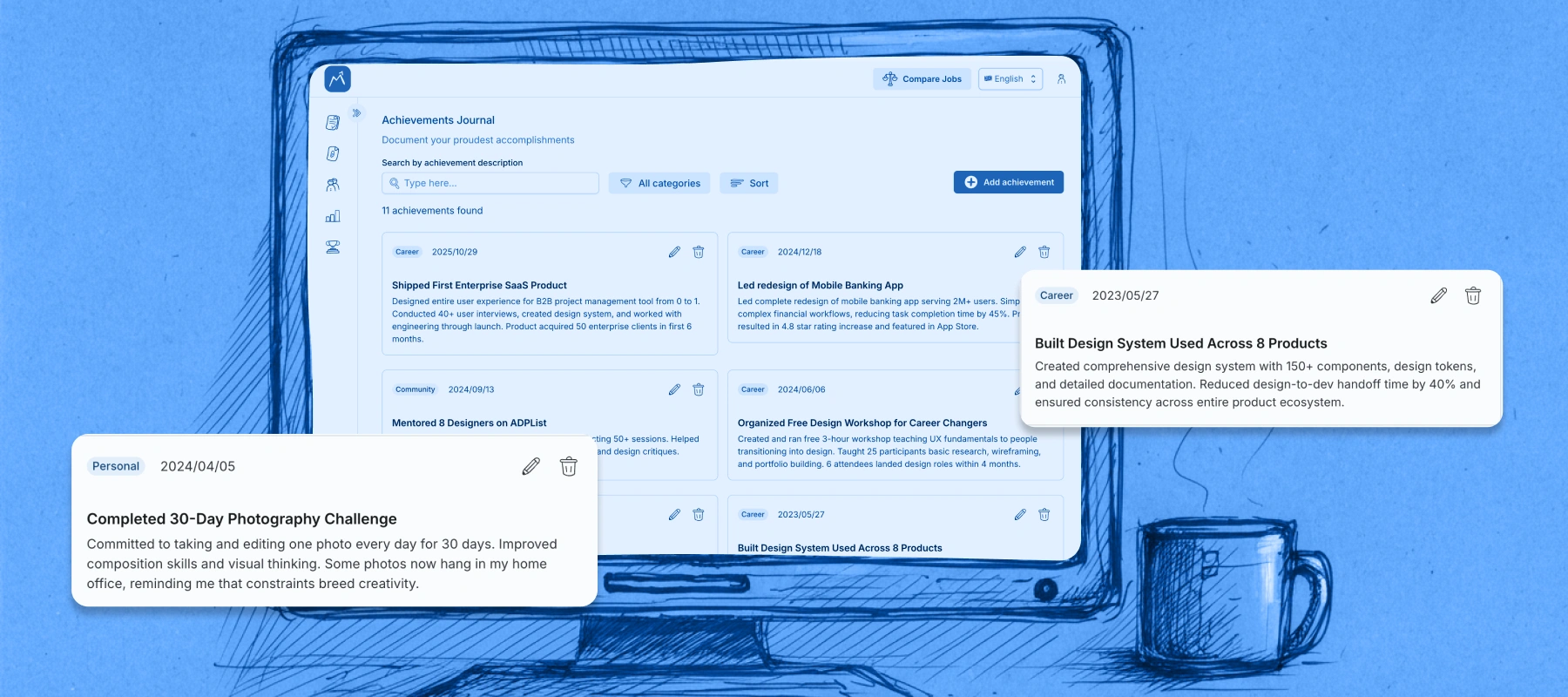What Is an Accomplishment Tracker?
Think of it as a running list of professional wins. Projects that went well, problems someone solved, times their manager said "great job" - that kind of stuff. Nothing complicated.
It could be a notes app on a phone, a spreadsheet with dates and details, or a dedicated platform that handles organization automatically. The format really doesn't matter much. What matters is having somewhere to capture those wins before they vanish into daily work chaos.
Because here's what happens without one: performance review time rolls around, and suddenly someone's scrambling. The details are fuzzy. But with an accomplishment tracker, they've got specific examples ready. Real proof of value. And that makes all the difference when raises or promotions are on the table.
Why It's Important to Track Your Work Accomplishments
Let's be honest - no one remembers everything they've done at work. Six months feels like six years when someone's trying to recall specific accomplishments in workplace projects or metrics from last quarter.
The biggest mistake? People wait until they desperately need this information. Performance review coming up? Scramble mode. Dream job posting appears? Panic trying to update that resume. Salary negotiation? Good luck arguing with "I think I did well" instead of numbers.

By then, they've forgotten half of what made them valuable.
Here's what tracking accomplishments at work actually prevents: walking into important conversations empty-handed. With a solid record, someone shows up to performance reviews with specific examples and metrics. They update resumes in minutes, not hours. They negotiate salary with data, not feelings. And when impostor syndrome hits - because it will - they've got real proof of progress sitting right there.
There's another benefit people don't talk about enough: the confidence boost. Work can feel endless. Job searching is exhausting. But having a documented list of wins? That fights the "am I even good at this?" thoughts that hit during tough weeks. Scrolling through past accomplishments on a rough day reminds someone they're more capable than current circumstances suggest. It's not ego - it's evidence.
Ready to stop forgetting your wins? Start tracking with MaxOfJob's Achievements Journal
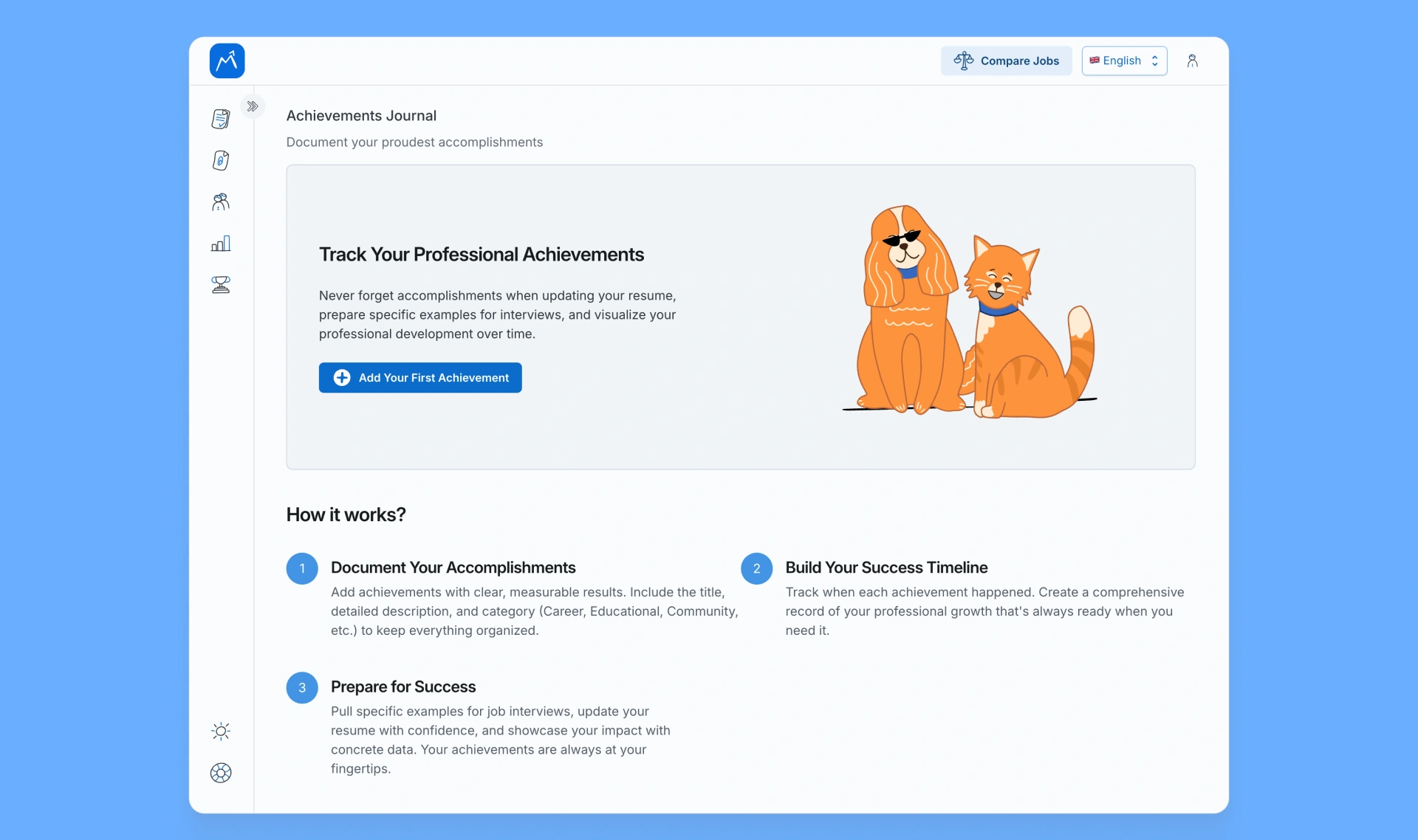
Key Elements of an Effective Accomplishment Tracker
Here's what actually works in an accomplishment tracker template, based on what makes entries useful months or years later:
Date - When did this happen? Month and year minimum. "Q3 2024" beats vague memories.
What was done - The actual action, not just the outcome. "Led website redesign" tells the story better than "successful project."
Measurable impact - Numbers matter. Percentages, time saved, revenue generated. Compare these two:
WEAK: "Led successful project"
STRONG: "Led Q3 website redesign that cut load time by 40% and increased conversions by 15%"
See the difference?
Skills demonstrated - What does this prove about capabilities? Project management? Problem-solving? Technical expertise?
Supporting details - Who noticed? What feedback came through? Manager praise, client testimonials, team recognition - it all counts.
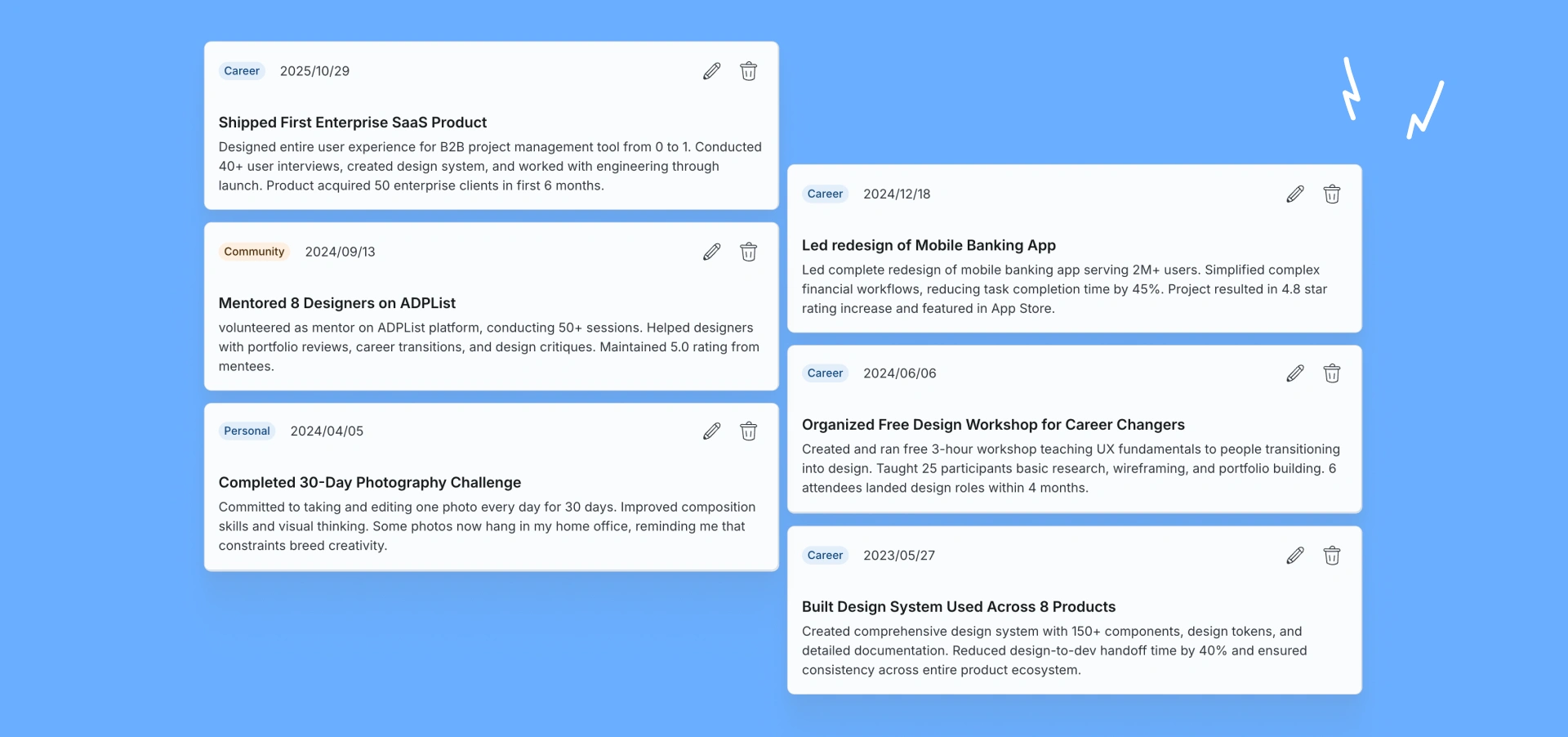
Not every accomplishment has numbers attached, and that's fine. Sometimes "prevented major client crisis through quick thinking" is just as valuable as percentage increases. The goal is capturing enough detail that future-self understands why this mattered.
MaxOfJob's Achievements Journal includes all these elements by default - just fill in what happened, the platform handles the rest.
How to Track Your Job Accomplishments Effectively
Okay, theory's great. But how does someone actually do this without it becoming another abandoned productivity system?
1. Decide on the best way to document your achievements
The format matters less than people think. Digital notes work - phone apps, OneNote, Notion. Or the classic work accomplishment tracker excel spreadsheet for spreadsheet lovers.
What really matters is consistency. Pick something accessible from anywhere - phone, computer, wherever work happens. Because if tracking requires opening three apps and finding the right template, it won't happen.
Dedicated tools like MaxOfJob remove that friction - organized by default, accessible from any device, no setup required. Everything connects with the job application tracker so career information lives in one place instead of scattered across apps.
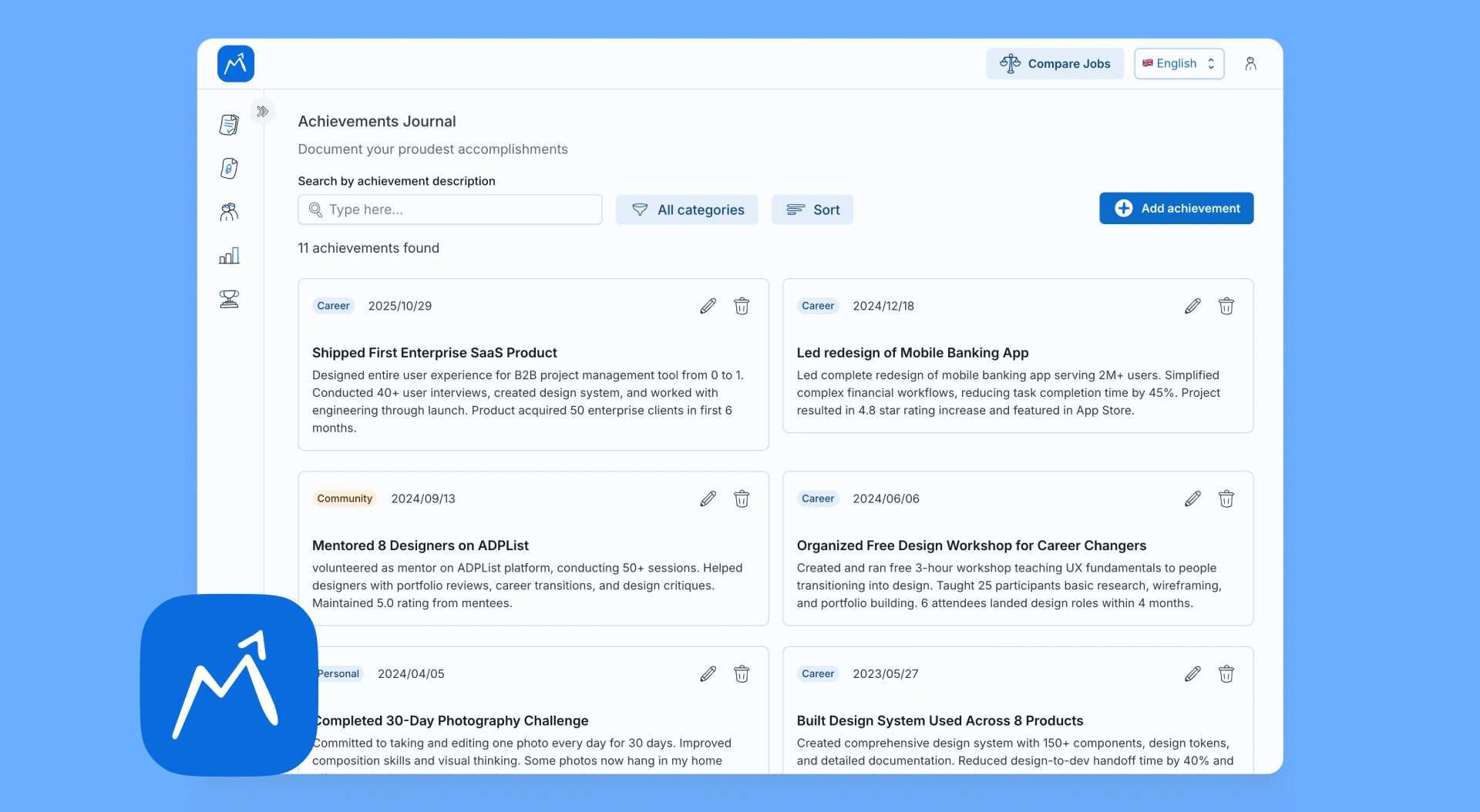
2. Choose between a personal or professional tracking method
Personal tracking means raw notes and full context. Professional tracking is what goes on LinkedIn or gets shared with a manager - polished and presentable.
MaxOfJob handles both. Capture accomplishments at work as they happen with all the messy details. The platform keeps everything organized, and when it's time to update a resume or prep for reviews, those raw entries are ready to polish. No switching between systems or digging through scattered notes.
3. Start compiling your list of accomplishments
Begin with the last three months while memory's fresh. Even starting with just last week works. Set a weekly reminder - Friday afternoons are great for this. Five minutes to capture what went well before the weekend.
Nothing feels significant? That's impostor syndrome talking. If it would impress someone on another person's resume, it counts. That's how to track accomplishments at work without overthinking it.
Step-by-Step Guide to Recording Your Achievements
Daily tracking sounds great in theory. In practice? Most people abandon it after a week. Here's what actually sticks:
Weekly (5 minutes): Review the past week and jot down anything noteworthy. Even "handled that client crisis without panicking" counts. Capture it while it's fresh.
Monthly (15 minutes): Look for patterns - which skills keep showing up? Polish 2-3 entries that might be needed soon. If something major happened, update that resume now instead of scrambling later.
Quarterly (30 minutes): Review everything. Identify the strongest examples for each key skill. Prep for performance reviews before they're scheduled.

Basically, make it simple. The work accomplishments tracker that takes less time wins over the perfect system that never gets used.
Which Work Accomplishments to Track
Not sure what deserves a spot in an accomplishments tracker? MaxOfJob's Achievements Journal breaks it down into clear categories:
Career The obvious wins - revenue generated, costs reduced, time saved. Problem-solving moments too. That time someone fixed what no one else could? Gold for interviews and any accomplishments slide example. Manager praise, awards, client thank-yous all count.
Education Certifications earned, courses completed, workshops finished. Even that industry conference where someone learned a new skill set.
Personal Side projects, creative pursuits, challenges completed. These show initiative and well-rounded capabilities.
Community Volunteer work, mentorship, organizing team events. Proves collaboration and leadership outside official job duties.
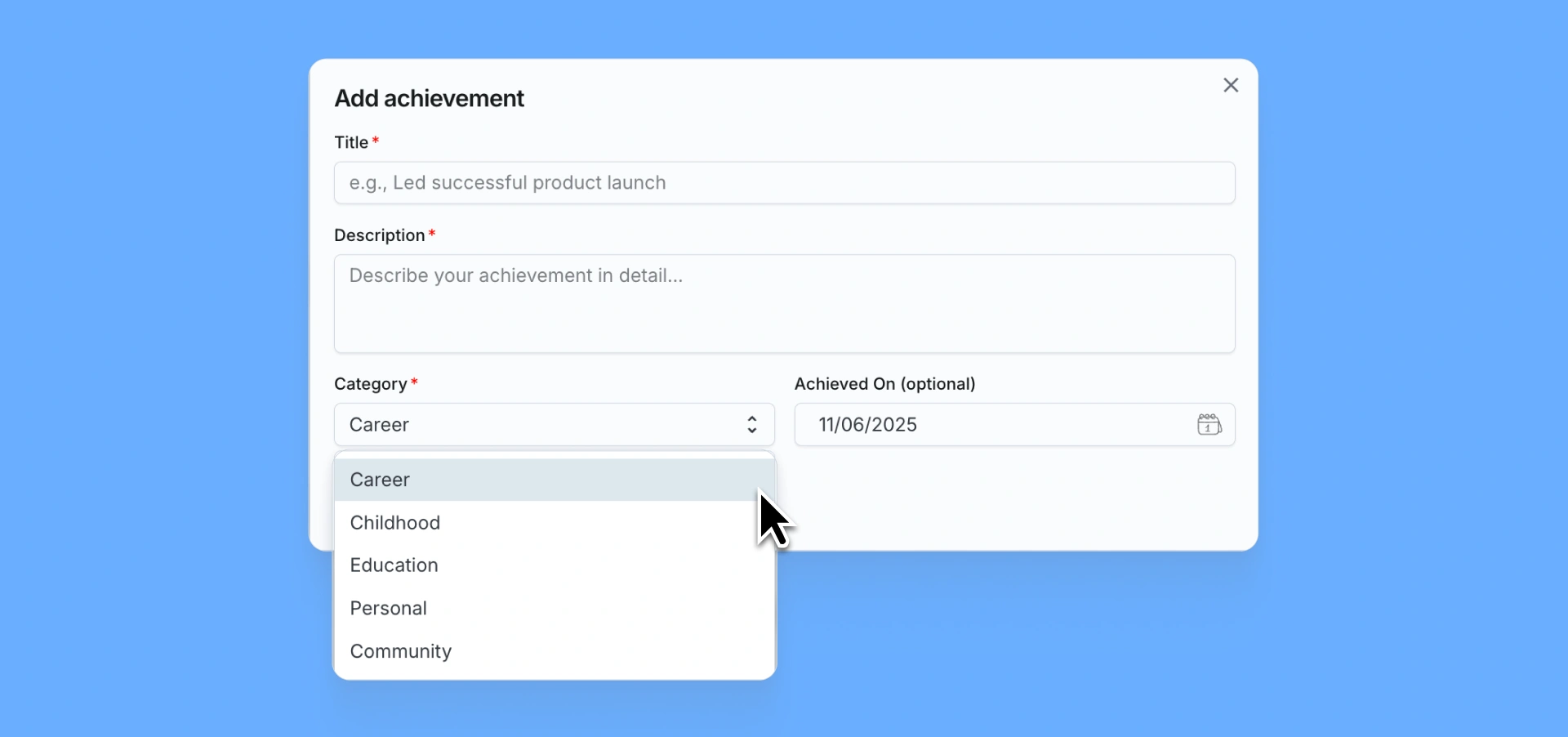
Here's the thing - not everything needs a percentage attached. "Navigated difficult stakeholder conversation and kept project moving" is just as valuable as "increased conversions by 15%." Both prove capability in different ways.
Conclusion
Next time someone walks into that performance review, they won't be scrambling to remember what they accomplished. That's the difference tracking accomplishments at work makes.
This isn't about ego. It's about not underselling value when it matters most - during salary negotiations, job searches, or promotion discussions. It's about having real evidence when doubt creeps in.
Start messy. Start small. Just start. Even capturing one win per week beats having nothing when opportunity knocks.
Future self will thank anyone who begins today. Here's to remembering how capable people actually are.
Ready to build a professional highlight reel? Try MaxOfJob's Achievements Journal free
.svg)










